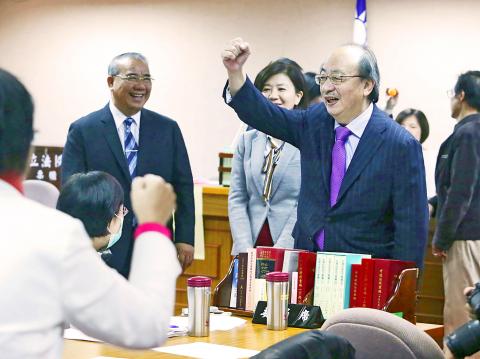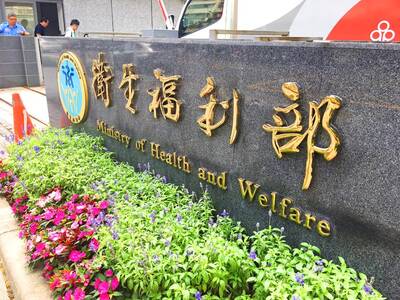The Democratic Progressive Party (DPP) yesterday secured the two convener seats for the legislature’s Judiciary and Organic Laws and Statutes Committee, which is expected to be the main battleground in the new legislative session amid the drives for pension reform and marriage equality.
DPP legislators Tuan Yi-kang (段宜康) and Tsai Yi-yu (蔡易餘) won the seats during the legislature’s committee convener elections.
Tuan, Tsai and Chinese Nationalist Party (KMT) Legislator Lin Wei-chou (林為洲) all received the same number of votes, so a drawing was held to break the tie.

Photo: CNA
Prior to the elections, the People First Party (PFP) gave up two of its seats on the committee to the KMT so that the KMT could compete for a convenor seat.
A committee convener has the right to arrange the review of legislative proposals, and the win by Tuan and Tsai could prove critical for the DPP government’s reform efforts.
The legislature has eight committees and each has two conveners; the DPP secured 11 of the convener seats.
DPP legislators Chiu Yi-ying (邱議瑩) and Gao Jyh-peng (高志鵬) were elected as the conveners of the Economics Committee, while their colleagues Cheng Pao-ching (鄭寶清) and Chen Ou-po (陳歐珀) won the Transportation Committee posts.
The DPP and KMT will share convener duties on five committees.
The DPP’s Pasuya Yao (姚文智) and the KMT’s William Tseng (曾銘宗) are to chair the Internal Administration Committee; Wang Ding-yu (王定宇) of the DPP and Johnny Chiang (江啟臣) of the KMT are to head the Foreign and National Defense Committee; the DPP’s Wang Jung-chang (王榮璋) and the KMT’s Lo Ming-tsai (羅明才) have the Finance Committee seats; the DPP’s Chen Ying (陳瑩) and the KMT’s Lee Yan-hsiu (李彥秀) are to call the shots for the Social Welfare and Environmental Hygiene Committee; and Hsu Chih-chieh (許智傑) of the DPP and Ko Chih-en (柯志恩) of the KMT are to head the Education and Culture Committee.
However, DPP caucus whip Ker Chien-ming (柯建銘) said the election results are not that important.
The party’s solidarity and its ability to communicate key policies are more important in pushing for pension, judicial and tax reforms as well as infrastructure budget proposals.
KMT caucus whip Sufin Siluko (廖國棟) said the KMT and the PFP share the same stance on the pension reform issue, and they would prevent the DPP from forcing through its reform plans.
In related news, the Cabinet and the DPP caucus yesterday thrashed out the bills to be put at the top of legislative agenda, which include amendments to laws governing the benefits of military personnel, public servants, public and private-school teachers and private-sector employees, and transitional justice proposals on political archives, promoting transitional justice, helping the development of Aboriginal languages and an amendment to the Status Act For Indigenous Peoples (原住民身分法).
Others on the list are related to economic development, urban renewal, tax reforms, long-term care and cross-strait relations, Cabinet spokesperson Hsu Kuo-yung (徐國勇) said.
As for the marriage equality proposals, the DPP caucus decided not to list them as urgent bills until there is further consensus among the DPP lawmakers.
Additional reporting by Lee Hsin-fang and CNA

POLAM KOPITIAM CASE: Of the two people still in hospital, one has undergone a liver transplant and is improving, while the other is being evaluated for a liver transplant A fourth person has died from bongkrek acid poisoning linked to the Polam Kopitiam (寶林茶室) restaurant in Taipei’s Far Eastern Sogo Xinyi A13 Department Store, the Ministry of Health and Welfare said yesterday, as two other people remain seriously ill in hospital. The first death was reported on March 24. The man had been 39 years old and had eaten at the restaurant on March 22. As more cases of suspected food poisoning involving people who had eaten at the restaurant were reported by hospitals on March 26, the ministry and the Taipei Department of Health launched an investigation. The Food and

A fourth person has died in a food poisoning outbreak linked to the Xinyi (信義) branch of Malaysian restaurant chain Polam Kopitiam (寶林茶室) in Taipei, Deputy Minister of Health and Welfare Victor Wang (王必勝) said on Monday. It was the second fatality in three days, after another was announced on Saturday. The 40-year-old woman experienced multiple organ failure in the early hours on Monday, and the family decided not to undergo emergency resuscitation, Wang said. She initially showed signs of improvement after seeking medical treatment for nausea, vomiting and diarrhea, but her condition worsened due to an infection, he said. Two others who

The long-awaited Taichung aquarium is expected to open next year after more than a decade of development. The building in Cingshui District (清水) is to feature a large ocean aquarium on the first floor, coral display area on the second floor, a jellyfish tank and Dajia River (大甲溪) basin display on the third, a river estuary display and restaurant on the fourth, and a cafe and garden on the fifth. As it is near Wuci Fishing Port (梧棲漁港), many are expecting the opening of the aquarium to bring more tourism to the harbor. Speaking at the city council on Monday, Taichung City Councilor

MEDICAL: The bills would also upgrade the status of the Ethical Guidelines Governing the Research of Human Embryos and Embryonic Stem Cell Research to law The Executive Yuan yesterday approved two bills to govern regenerative medicine that aim to boost development of the field. Taiwan would reach an important milestone in regenerative medicine development with passage of the regenerative medicine act and the regenerative medicine preparations ordinance, which would allow studies to proceed and treatments to be developed, Deputy Minister of Health and Welfare Victor Wang (王必勝) told reporters at a news conference after a Cabinet meeting. Regenerative treatments have been used for several conditions, including cancer — by regenerating blood cells — and restoring joint function in soft tissue, Wang said. The draft legislation requires regenerative treatments